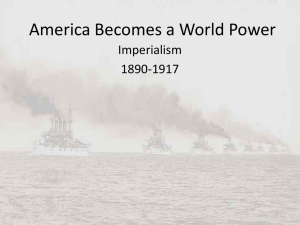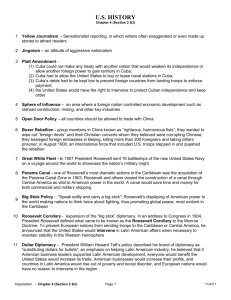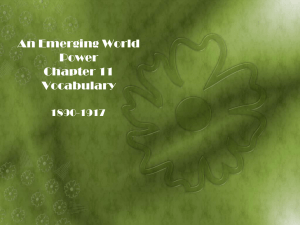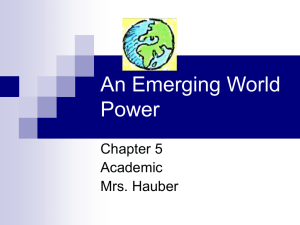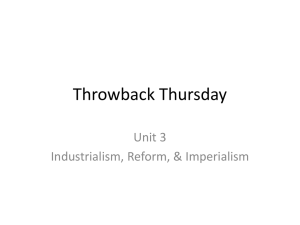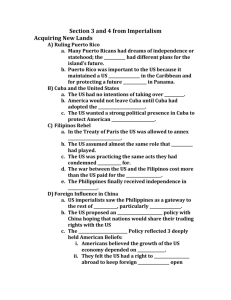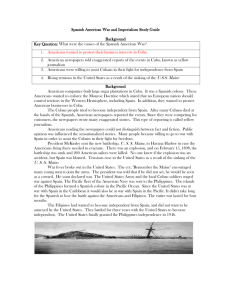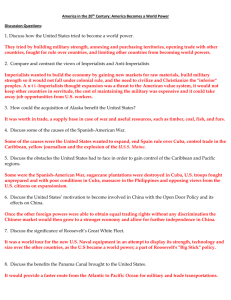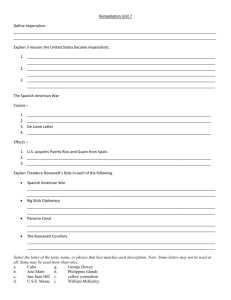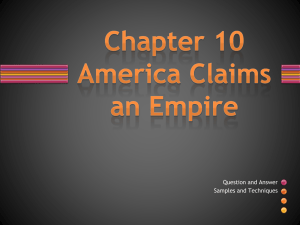Chapter20_ForeignPol..
advertisement
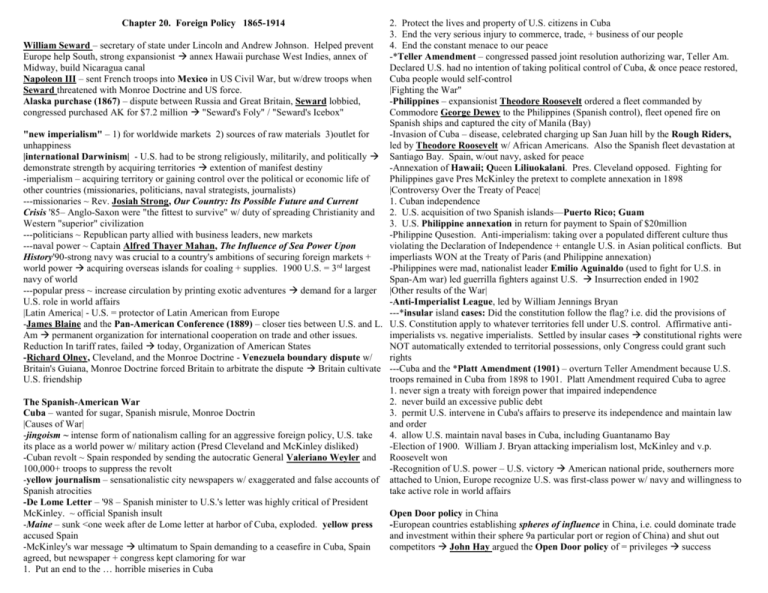
2. Protect the lives and property of U.S. citizens in Cuba 3. End the very serious injury to commerce, trade, + business of our people William Seward – secretary of state under Lincoln and Andrew Johnson. Helped prevent 4. End the constant menace to our peace Europe help South, strong expansionist annex Hawaii purchase West Indies, annex of -*Teller Amendment – congressed passed joint resolution authorizing war, Teller Am. Midway, build Nicaragua canal Declared U.S. had no intention of taking political control of Cuba, & once peace restored, Napoleon III – sent French troops into Mexico in US Civil War, but w/drew troops when Cuba people would self-control Seward threatened with Monroe Doctrine and US force. |Fighting the War" Alaska purchase (1867) – dispute between Russia and Great Britain, Seward lobbied, -Philippines – expansionist Theodore Roosevelt ordered a fleet commanded by congressed purchased AK for $7.2 million "Seward's Foly" / "Seward's Icebox" Commodore George Dewey to the Philippines (Spanish control), fleet opened fire on Spanish ships and captured the city of Manila (Bay) "new imperialism" – 1) for worldwide markets 2) sources of raw materials 3)outlet for -Invasion of Cuba – disease, celebrated charging up San Juan hill by the Rough Riders, unhappiness led by Theodore Roosevelt w/ African Americans. Also the Spanish fleet devastation at |international Darwinism| - U.S. had to be strong religiously, militarily, and politically Santiago Bay. Spain, w/out navy, asked for peace demonstrate strength by acquiring territories extention of manifest destiny -Annexation of Hawaii; Queen Liliuokalani. Pres. Cleveland opposed. Fighting for -imperialism – acquiring territory or gaining control over the political or economic life of Philippines gave Pres McKinley the pretext to complete annexation in 1898 other countries (missionaries, politicians, naval strategists, journalists) |Controversy Over the Treaty of Peace| ---missionaries ~ Rev. Josiah Strong, Our Country: Its Possible Future and Current 1. Cuban independence Crisis '85– Anglo-Saxon were "the fittest to survive" w/ duty of spreading Christianity and 2. U.S. acquisition of two Spanish islands—Puerto Rico; Guam Western "superior" civilization 3. U.S. Philippine annexation in return for payment to Spain of $20million ---politicians ~ Republican party allied with business leaders, new markets -Philippine Qusestion. Anti-imperialism: taking over a populated different culture thus ---naval power ~ Captain Alfred Thayer Mahan, The Influence of Sea Power Upon violating the Declaration of Independence + entangle U.S. in Asian political conflicts. But History'90-strong navy was crucial to a country's ambitions of securing foreign markets + imperliasts WON at the Treaty of Paris (and Philippine annexation) world power acquiring overseas islands for coaling + supplies. 1900 U.S. = 3 rd largest -Philippines were mad, nationalist leader Emilio Aguinaldo (used to fight for U.S. in navy of world Span-Am war) led guerrilla fighters against U.S. Insurrection ended in 1902 ---popular press ~ increase circulation by printing exotic adventures demand for a larger |Other results of the War| U.S. role in world affairs -Anti-Imperialist League, led by William Jennings Bryan |Latin America| - U.S. = protector of Latin American from Europe ---*insular island cases: Did the constitution follow the flag? i.e. did the provisions of -James Blaine and the Pan-American Conference (1889) – closer ties between U.S. and L. U.S. Constitution apply to whatever territories fell under U.S. control. Affirmative antiAm permanent organization for international cooperation on trade and other issues. imperialists vs. negative imperialists. Settled by insular cases constitutional rights were Reduction In tariff rates, failed today, Organization of American States NOT automatically extended to territorial possessions, only Congress could grant such -Richard Olney, Cleveland, and the Monroe Doctrine - Venezuela boundary dispute w/ rights Britain's Guiana, Monroe Doctrine forced Britain to arbitrate the dispute Britain cultivate ---Cuba and the *Platt Amendment (1901) – overturn Teller Amendment because U.S. U.S. friendship troops remained in Cuba from 1898 to 1901. Platt Amendment required Cuba to agree 1. never sign a treaty with foreign power that impaired independence 2. never build an excessive public debt The Spanish-American War Cuba – wanted for sugar, Spanish misrule, Monroe Doctrin 3. permit U.S. intervene in Cuba's affairs to preserve its independence and maintain law |Causes of War| and order -jingoism ~ intense form of nationalism calling for an aggressive foreign policy, U.S. take 4. allow U.S. maintain naval bases in Cuba, including Guantanamo Bay its place as a world power w/ military action (Presd Cleveland and McKinley disliked) -Election of 1900. William J. Bryan attacking imperialism lost, McKinley and v.p. -Cuban revolt ~ Spain responded by sending the autocratic General Valeriano Weyler and Roosevelt won 100,000+ troops to suppress the revolt -Recognition of U.S. power – U.S. victory American national pride, southerners more -yellow journalism – sensationalistic city newspapers w/ exaggerated and false accounts of attached to Union, Europe recognize U.S. was first-class power w/ navy and willingness to Spanish atrocities take active role in world affairs -De Lome Letter – '98 – Spanish minister to U.S.'s letter was highly critical of President McKinley. ~ official Spanish insult Open Door policy in China -Maine – sunk <one week after de Lome letter at harbor of Cuba, exploded. yellow press -European countries establishing spheres of influence in China, i.e. could dominate trade accused Spain and investment within their sphere 9a particular port or region of China) and shut out -McKinley's war message ultimatum to Spain demanding to a ceasefire in Cuba, Spain competitors John Hay argued the Open Door policy of = privileges success agreed, but newspaper + congress kept clamoring for war 1. Put an end to the … horrible miseries in Cuba Chapter 20. Foreign Policy 1865-1914 - Boxer Rebellion '00 – nationalism and xenophobia (hatred and fear of foreigners) rose in China Society of Harmonious Fists or Boxes murdered Christian missionaries. U.S. + others marched into Beijing and crushed them China pay huge sum in indemnities -Hay's second round of notes 1. preserve China's territorial integrity 2. safeguard "= and impartial trade w/ all parts of Chinese empire" |Theodore Roosevelt's big-stick policy| -McKinley shot by an anarchist (opposed all gov't), v.p. Roosevelt succeed "to speak softly and carry a big stick" on foreign policy U.S. world power |The Panama Canal| -Revolution in Panama, controlled by Colombia, Roosevelt supported revolt in Panama independent Panama granted U.S. control of the canal zone -*Hay-Pauncefote Treaty (1901) U.S. could dig canal w/out British involvement -building the canal 1904 – 1914, thanks to chief engineer George Goethals and mosquitoeliminator Dr. William Gorgas |The Roosevelt Corollary to the Monroe Doctrine| Monroe Doc – Roosevelt declared U.S. would intervene whenever necessary, would send gunboats to a Latin American country that was delinquent in paying debts, U.S. sailors occupy country's major ports to collect tax forces in Haiti, Honduras, Dom. Republic (San Dominigo), and Nicaragua poor U.S. relations w/ Lat America |East Asia| - Russo-Japanese War, Jap winning *Treaty of Portsmouth (1905), Jap mad for not getting all they wanted Rooevelt won Nobel Peace Prize -"gentlemen's agreement" – laws of Jap-discrimination CA laws Jpan govt secretly agrred to restrict emigration of Jap workers in return for repealing discriminatory laws -great white fleet – demonstrating the power, around-the-world cruise, Jap warmed welcomed them -*Root-Takahira Agreement (1908) – 1. mutual respect for each nation's Pacific possessions 2. support for open Door policy |Peace Efforts| ~ all the above was for peace -Algeciras Conference (1906) by Roosevelt in Spain ~ settled a conflict between France and Germany over Morocco William Howard Taft and dollar diplomacy -Taft didn't carry a big stick, policy was promoting U.S. trade by supporting Americans enterprises abroad ~ dollar diplomacy |Dollar Diplomacy in East Asia and Latin America| -obstacle: growing anti-imperialism ---railroads in China, Russia and Japan excluded U.S. in Manchuria ---intervention in Nicaragua, U.S. intervened Nicaragua's financial affairs and sent marines when civil war broke out in 1912. |Lodge Corollary| - Henry Cabot Lodge – Repub senator passed Lodge Corollary to the Monroe Doctrine – non-European powers (Jap) would be excluded from owning territory in the Western Hemisphere, Pres Taft opposed Woodrow Wilson and moral diplomacy -Wilson called New Freedom in gov't promised a moral approach to foreign affairs |Moral Diplomacy| -high moral standard to foreign relations w/ Wiliam Jennings Bryan -righting past wrongs ~ opposed to self-interested imperialism ---1) The Philippines - Wilson won passage of the Jones Act (1916) 1. granted full territorial status 2. bill of rights and univ. male suffrage to Filipino 3. promised Philippine independence a.s.a. stable gov't established ---2) Puerto Rico – U.S. citizenship granted & limited self-gov't ---3) Panama Canal – repeal act that had granted U.S. ships an exemption from paying canal tolls angered nationalists (Roosevelt, Lodge), pleased British -Conciliation treaties by Bryan |Military Intervention in Latin America| ~ in order to maintain stability and protection in region |Conflict in Mexico| -for Mexican civil war, Wilson refused to recognize the military dictatorship of General Victoriano Huerta who seized power in Mexico by arranging to assassinate the elected president -Tampico incident – arms embargo against Mexican gov't, fleet to blockade port of Vera Cruz, American seament at Tampico arrested and released by Mexican, Huerta refused to apologize. War between Mexico and U.S. imminent, averted by ABC (Argentina, Brazil, Chile) powers to mediate the dispute, 1st dispute in Americas to be settled through joint mediation -Pancho Villa and the U.S. expeditionary force – Huerta replaced by more democratic Venustiano Carranza, Villa led raids across U.S.-Mexican border to destabilize the opponent's gov't. Prs Wilson ordered General John J. Pershing to pursuer Villa into Mexico ~ expeditionary force but couldn't capture Villa, pressure of WWI withdrew troops

